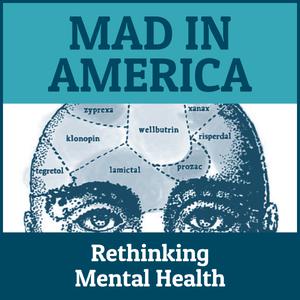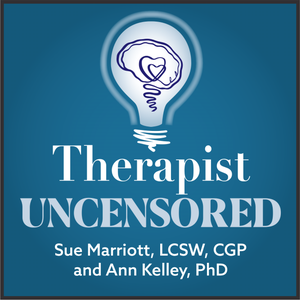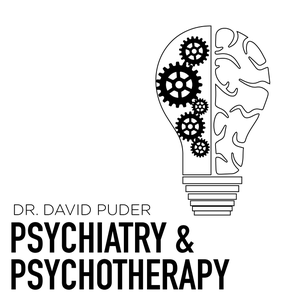
Mad in America: Rethinking Mental Health
Mad in America
Science, Psychiatry and Social Justice
- 48 minutes 41 secondsMad Sisters: An Interview With Susan Grundy
Susan Grundy is an author who writes about the weight of emotional distress and an easier way of being. Her book, Mad Sisters, is a highly personal account of her caregiving journey for an older sister diagnosed with schizophrenia at the age of 13. When not at her writing desk, Susan can be found walking in nature towards a café. She divides her time between Montreal and London.
***
Thank you for being with us to listen to the podcast and read our articles this year. MIA is funded entirely by reader donations. If you value MIA, please help us continue to survive and grow. https://www.madinamerica.com/donate/
To find the Mad in America podcast on your preferred podcast player, click here: https://pod.link/1212789850
11 December 2024, 8:00 am - 44 minutes 51 secondsThe Anatomy of Anxiety: An Interview With Ellen Vora
Ellen Vora is a board-certified psychiatrist, acupuncturist, and yoga teacher. She's the author of The Anatomy of Anxiety and takes a functional medicine approach to mental health. She considers the whole person and addresses imbalance at the root. Dr. Vora received her BA from Yale University and her MD from Columbia University.
***
Thank you for being with us to listen to the podcast and read our articles this year. MIA is funded entirely by reader donations. If you value MIA, please help us continue to survive and grow by becoming a subscriber. https://www.madinamerica.com/donate/
To find the Mad in America podcast on your preferred podcast player, click here: https://pod.link/1212789850
© Mad in America 2024. Produced by James Moore https://www.jmaudio.org
20 November 2024, 8:00 am - 39 minutes 43 secondsOne Person's Journey from Medical Model Advocate to Skeptic: An Interview with Rose Cartwright
Rose Cartwright is a screenwriter and the author of Pure, a hugely successful memoir which was then turned into a series for Channel Four. She is also a writer and producer on Netflix’s 3 Body Problem. Pure portrayed Rose’s autobiographical account of finding that she had OCD, a “mental illness”, and the breakthrough that this medical framework provided her. This was short-lived. In her new book The Maps We Carry, she writes about the dawning realization that the “illness” story she had believed in and publicly advocated for, was wretchedly incomplete and often dangerous.
In this interview, Cartwright charts her journey of painful and lonely disillusionment with the “mental illness” framework. She talks about understanding the place of her own childhood trauma and also the limitations of simplistic trauma narratives. She speaks about the place of psychedelics and meditation in helping her uncover her disconnection, eventually to realize the importance of trusting relationships and communities. In this brutally honest book and interview, Cartwright reflects on the importance of holding all our understandings around mental health and suffering, lightly.
***
Thank you for being with us to listen to the podcast and read our articles this year. MIA is funded entirely by reader donations. If you value MIA, please help us continue to survive and grow. https://www.madinamerica.com/donate/
To find the Mad in America podcast on your preferred podcast player, click here: https://pod.link/1212789850
© Mad in America 2024. Produced by James Moore https://www.jmaudio.org
6 November 2024, 8:00 am - 51 minutesWe Should Listen to Our Emotional Pain: An interview with Paul Andrews
Dr. Paul Andrews is an Associate Professor of Evolutionary Psychology in the Department of Psychology, Neuroscience and Behaviour at McMaster University. His research focuses on understanding the evolution of depression, which he argues may be an evolved emotional response for understanding and solving complex problems. Dr. Andrews is also concerned with the evolution of the serotonin system and the effects of antidepressants on mental and physical health. His research has shown an increased risk of cardiovascular events, as well as death among those who use antidepressants.
***
Thank you for being with us to listen to the podcast and read our articles this year. MIA is funded entirely by reader donations. If you value MIA, please help us continue to survive and grow. https://www.madinamerica.com/donate/
To find the Mad in America podcast on your preferred podcast player, click here: https://pod.link/1212789850
© Mad in America 2024. Produced by James Moore https://www.jmaudio.org
23 October 2024, 7:00 am - 45 minutes 1 secondWhy Does a Parent Medicate a Child? An Interview with My Mother
In this interview, Brooke Siem, who is the author of a memoir on antidepressant withdrawal, May Cause Side Effects, interviews her mother, Dee Barbash, to discuss the circumstances that led to Brooke being prescribed a cocktail of antidepressants at the age of 15. Today, her mother is a therapist who helps her clients taper from psychiatric medications – a profession that she took up after she came to understand the harms that Brooke suffered from having been prescribed these drugs for 15 years.
***
Thank you for being with us to listen to the podcast and read our articles this year. MIA is funded entirely by reader donations. If you value MIA, please help us continue to survive and grow.
To find the Mad in America podcast on your preferred podcast player, click here
© Mad in America 2024. Produced by James Moore
9 October 2024, 7:00 am - 49 minutes 10 secondsFrom Freud to Fanon: How Daniel Gaztambide is Redefining Psychoanalytic Practice
Daniel José Gaztambide is an assistant professor of psychology at Queens College and the director of the Frantz Fanon Lab for Decolonial Psychology. His research and clinical work focus on Puerto Rican and Latinx populations, ethnic minority identity, psychotherapy, and the social determinants of health.
Daniel is the author of A People’s History of Psychoanalysis: From Freud to Liberation Psychology and the newly published Decolonizing Psychoanalytic Technique: Putting Freud on Fanon’s Couch.
He earned his doctorate from Rutgers University, where he specialized in multicultural psychology, anxiety, and trauma. Beyond his clinical practice, Daniel is deeply committed to addressing racial injustice through his writing and activism. He has served as a liaison to the American Psychological Association (APA) on racial and ethnic minority issues and contributed to the APA’s 2020-2021 Taskforce on Strategies for the Elimination of Racism, Discrimination, and Hate.
In our conversation, Daniel highlights the importance of cultural humility and understanding the impact of marginalization across race, class, gender, and ability on psychotherapy. His latest book provides a blend of clinical techniques and political strategies to address these complex issues through a decolonial psychoanalytic lens.
***
Thank you for being with us to listen to the podcast and read our articles this year. MIA is funded entirely by reader donations. If you value MIA, please help us continue to survive and grow.
To find the Mad in America podcast on your preferred podcast player, click here
© Mad in America 2024. Produced by James Moore
***
2 October 2024, 7:00 am - 42 minutes 1 secondThe Path from Trauma to The Power of Nature: An Interview with Banning Lyon
Our guest today is Banning Lyon, author of The Chair and The Valley: A Memoir of Trauma, Healing, and The Outdoors. An account of the abuse he suffered after being hospitalized in a psychiatric facility at age 15 and the long journey toward joy and awe that followed, his memoir was published this spring by Penguin Random House. He first wrote about his experiences in 1993 for The New York Times and, more recently, for the Washington Post.
Based in California’s bay area, Lyon is an outdoor educator and backpacking guide whose engagement with nature was a key force in his recovery. His website is banninglyon.com.
***
Thank you for being with us to listen to the podcast and read our articles this year. MIA is funded entirely by reader donations. If you value MIA, please help us continue to survive and grow.
To find the Mad in America podcast on your preferred podcast player, click here
© Mad in America 2024. Produced by James Moore
4 September 2024, 7:00 am - 45 minutes 46 secondsMultiplicity and Mad Studies: An Interview with Jazmine Russell
Jazmine Russell is the co-founder of the Institute for the Development of Human Arts (IDHA), a transformative mental health training institute, and the host of the Depth Work Podcast. As a writer, educator, and scholar, Jazmine works at the intersection of mad studies, critical psychology, and neuroscience. Her work is deeply informed by her lived experiences surviving complex trauma, psychosis, and an autoimmune disease.
Jazmine's focus extends to the intersection of mental health and chronic illness, particularly exploring the overlap of psychosis, trauma, and autoimmunity. This has led her to bridge critical neuroscience communities with the mad movement. In addition to her scholarly pursuits, Jazmine continues to see clients as a trauma-informed holotropic breathwork practitioner.
She is also a co-editor of the forthcoming Mad Studies Reader: Interdisciplinary Innovations in Mental Health (Routledge, 2024). Today, we will delve into her background, her journey to co-founding IDHA, her current work and podcast, and the insights she offers in the upcoming Mad Studies Reader.
***
Thank you for being with us to listen to the podcast and read our articles this year. MIA is funded entirely by reader donations. If you value MIA, please help us continue to survive and grow.
To find the Mad in America podcast on your preferred podcast player, click here
© Mad in America 2024. Produced by James Moore
28 August 2024, 7:00 am - 54 minutes 53 secondsThe Maudsley Deprescribing Guidelines- An Interview with David Taylor and Mark Horowitz
In this interview for MIA Radio, Brooke Siem speaks with David Taylor and Mark Horowitz about their publication of the Maudsley Deprescribing Guidelines, which is of particular note since the Maudsley Prescribing Guidelines is a leading text in medicine worldwide.
David Taylor is the Director of Pharmacy and Pathology at Maudsley Hospital and a Professor of Psychopharmacology at King's College in London. He is also the editor-in-chief of the journal Therapeutic Advances in Psychopharmacology. Beyond academia, he contributes significantly to public health policy as a member of the United Kingdom's Department of Transport expert panel that introduced drug-driving regulations. He is also a current member of the UK government's Advisory Council on the Misuse of Drugs and is the only pharmacist to have been made an honorary fellow of the Royal College of Psychiatrists. David is the lead author of the Maudsley Prescribing Guidelines, a role he has held since their inception in 1993.
The Maudsley Prescribing Guidelines have achieved significant success, with over 300,000 copies sold across 14 editions and translations into 12 languages. David has also authored 450 clinical papers published in prominent journals such as The Lancet, BMJ, British Journal of Psychiatry, and Journal of Clinical Psychiatry. His work has been cited over 25,000 times.
Mark Horowitz is a clinical research fellow in psychiatry at the National Health Service (NHS) in London. He is a Visiting Lecturer in Psychopharmacology at King's College London and an Honorary Clinical Research Fellow at University College London, in addition to being a trainee psychiatrist. Mark holds a PhD from the Institute of Psychiatry, Psychology, and Neuroscience at King's College London, specializing in the neurobiology of depression and antidepressant action. He is the lead author of the Maudsley Deprescribing Guidelines and an associate editor of Therapeutic Advances in Psychopharmacology.
Mark co-authored the recent Royal College of Psychiatry's guidance on stopping antidepressants, and his work has informed the recent NICE guidelines on the safe tapering of psychiatric medications, including antidepressants, benzodiazepines, and z-drugs. He has collaborated with the NHS to develop national guidance for safe deprescribing for clinicians and has been commissioned by Health Education England to prepare a teaching module on how to safely stop antidepressants.
Mark has published several papers on safe approaches to tapering psychiatric medications, with contributions in The Lancet Psychiatry, JAMA Psychiatry, and Schizophrenia Bulletin. His interest lies in rational psychopharmacology and the deprescribing of psychiatric medications, which is deeply informed by his personal experiences of the challenges associated with coming off psychiatric medications.
***
Thank you for being with us to listen to the podcast and read our articles this year. MIA is funded entirely by reader donations. If you value MIA, please help us continue to survive and grow. https://www.madinamerica.com/donate/
To find the Mad in America podcast on your preferred podcast player, click here: https://pod.link/1212789850
© Mad in America 2024. Produced by James Moore https://www.jmaudio.org
21 August 2024, 7:00 am - 45 minutes 37 secondsOur Medical System Protects Wrongdoers and Punishes Whistleblowers: An Interview with Carl Elliott
Carl Elliott is a distinguished professor at the University of Minnesota with joint appointments in the Department of Philosophy and the School of Journalism and Mass Communications.
An influential voice in bioethics, Elliott is known for his critical examination of the medical and pharmaceutical industries. His latest book, The Occasional Human Sacrifice: Medical Experimentation and the Price of Saying No,describes the harrowing experiences of whistleblowers who expose corruption and malpractice in clinical trials and psychiatric research.
Originally from South Carolina, Elliott's diverse academic background includes a medical degree and a PhD in philosophy from Glasgow University in Scotland. His extensive postdoctoral work has taken him to institutions such as the University of Chicago, the University of Otago in New Zealand, and the Nelson Mandela School of Medicine in South Africa. Elliott is the author and editor of several influential books, including Better than Well: American Medicine Meets the American Dream and White Coat and Black Hat: Adventures on the Dark Side of Medicine. His articles have been featured in prestigious publications such as The New Yorker, The Atlantic Monthly, Mother Jones, and The New England Journal of Medicine (as well as Mad in America). Elliott's critical work in bioethics has earned him numerous accolades, including the Erikson Prize for Excellence in Mental Health Media and a fellowship at the Safra Center for Ethics at Harvard University.
His investigative work has shed light on numerous scandals, including the tragic case of Dan Markingson, a young man who died during a controversial clinical trial at the University of Minnesota. In this interview, Elliott discusses the systemic issues that protect wrongdoers, the personal and professional toll on those who speak out, and the broader implications for ethics in medical research and practice.
***
Thank you for being with us to listen to the podcast and read our articles this year. MIA is funded entirely by reader donations. If you value MIA, please help us continue to survive and grow.
To find the Mad in America podcast on your preferred podcast player, click here
© Mad in America 2024. Produced by James Moore
7 August 2024, 7:00 am - 40 minutes 47 secondsBeyond Paternalism or Abandonment in Mental Health Care: An Interview with Neil Gong
Neil Gong is an assistant professor of sociology at UC San Diego, where he researches psychiatric services, homelessness, and how communities seek to maintain social order. Neil's new book, "Sons, Daughters, and Sidewalk Psychotics: Mental Illness and Homelessness in Los Angeles," published by the University of Chicago Press, offers a detailed look into the starkly different worlds of mental health care in Los Angeles. He contrasts the public safety-net clinics, which strive to keep patients housed and out of jail, with the elite private care centers that cater to the wealthy. He finds that while the public system focuses on survival and containment, often providing only minimal care, the private system aims at rehabilitation and respectability, albeit sometimes at the cost of personal freedom.
Neil’s extensive fieldwork included spending nights in homeless encampments, shadowing social workers, and engaging with patients and families across the socioeconomic spectrum. His work highlights systemic failures and societal indifference but also the humanity of those working and living within these disparate treatment systems. In our conversation, we unpack the critical insights from his book and explore the broader implications of his research. How do these disparate systems reflect our societal values? What can we learn about the intersection of mental health, homelessness, and social policy? And perhaps most importantly, how can we move towards a more equitable and humane approach to mental health care?
***
Thank you for being with us to listen to the podcast and read our articles this year. MIA is funded entirely by reader donations. If you value MIA, please help us continue to survive and grow.
To find the Mad in America podcast on your preferred podcast player, click here
© Mad in America 2024. Produced by James Moore
17 July 2024, 7:00 am - More Episodes? Get the App
Your feedback is valuable to us. Should you encounter any bugs, glitches, lack of functionality or other problems, please email us on [email protected] or join Moon.FM Telegram Group where you can talk directly to the dev team who are happy to answer any queries.
 Therapist Uncensored Podcast
Therapist Uncensored Podcast
 PsychEd: educational psychiatry podcast
PsychEd: educational psychiatry podcast
 Psychiatry & Psychotherapy Podcast
Psychiatry & Psychotherapy Podcast
 Psychopharmacology and Psychiatry Updates
Psychopharmacology and Psychiatry Updates
 The Carlat Psychiatry Podcast
The Carlat Psychiatry Podcast
 Mad in America: Science News
Mad in America: Science News